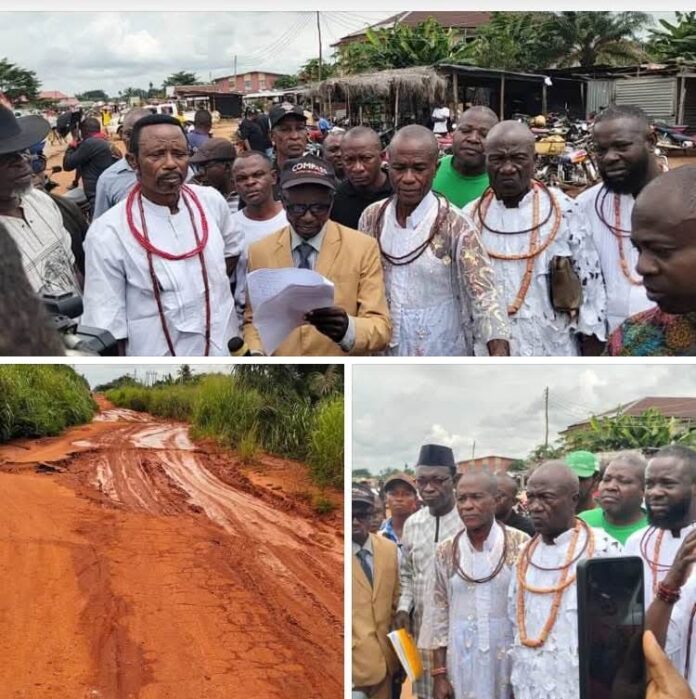AGBOR: The Abavo Kingdom in Ika South Local Government Area of Delta State has once again raised alarm over the deplorable state of the Agbor-Amukpe section of the Uromi-Amukpe Road, a federal project awarded more than a decade ago but left abandoned, leaving behind untold hardship for residents, commuters, and farmers.
For the people of Abavo, the road has become more than just a failed infrastructure project, it is a symbol of neglect, dashed hopes, and a threat to their very survival.
Speaking at a press briefing on Friday, August 22, 2025, the President General of the Abavo Clan Union, Pastor Justine Onyeibe, expressed deep frustration over the abandoned road.
According to him, the Agbor-Amukpe stretch, which was awarded in 2014, received partial mobilisation but has remained in a state of abandonment since then.
What should have been a blessing has turned into a curse, Onyeibe said. This road has not only deteriorated beyond recognition but has also endangered lives, increased insecurity, and destroyed our economy.
The once-busy highway, which connected traders, travelers, and farming communities across Delta and Edo states, has now degenerated into an impassable route, riddled with gullies, overgrown bushes, and failed portions that have become hideouts for criminals.
The Abavo leader linked the surge in kidnappings in the kingdom to the condition of the road. According to him, criminals take advantage of the bad portions to ambush unsuspecting commuters, while the fear of abduction has forced many residents to avoid travel altogether.
He also noted that the insecurity has spilled into the farmlands, as herders have occupied abandoned agricultural spaces, leading to clashes, loss of livelihoods, and heightened tension within the community.
Beyond security concerns, the dilapidated road has dealt a devastating blow to the agrarian economy of Abavo.
Once celebrated as a major food basket of Delta State, with supplies reaching neighbouring states, the community now struggles with declining agricultural output.
Farmers, fearful of kidnappers and unable to transport goods to markets, have abandoned farmlands. The result has been increased poverty, food scarcity, and rising costs of produce.
This road has destroyed our local economy, Onyeibe stressed. Our farmers can no longer farm, our traders can no longer trade, and our people live in fear every day. Abavo is becoming a shadow of itself.
Community leaders also pointed out the irony that Abavo, despite producing a governor who served Delta State for eight years, still suffers such levels of infrastructural neglect.
Residents argue that successive governments at both federal and state levels have turned a blind eye to their plight, despite repeated appeals.
Several delegations, petitions, and peaceful protests have been staged in the past, but the people say their cries have continued to fall on deaf ears.
The Abavo Clan Union has therefore appealed to all levels of government federal, state, and local—to treat the road as a matter of urgency.
They warned that continued neglect could escalate insecurity, worsen poverty, and completely displace farming families who form the backbone of the local economy.
Our demand is simple, Onyeibe concluded. We want the government to return to site and complete this road. The lives, economy, and future of Abavo depend on it.”
For now, the abandoned Agbor-Amukpe Road remains a gaping wound in the heart of Abavo, one that residents say will only heal when genuine political will is shown through action rather than promises.



